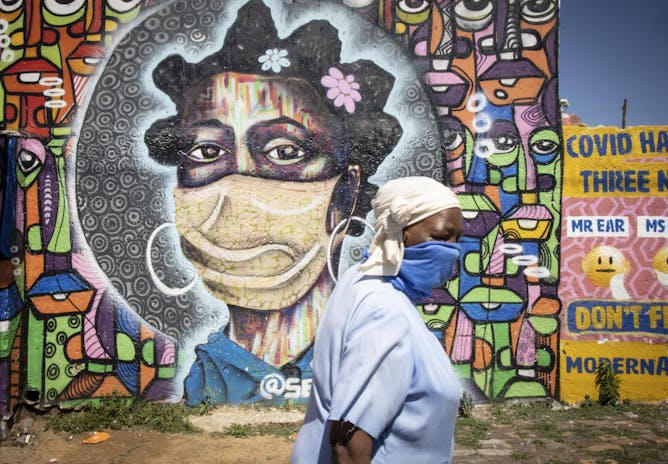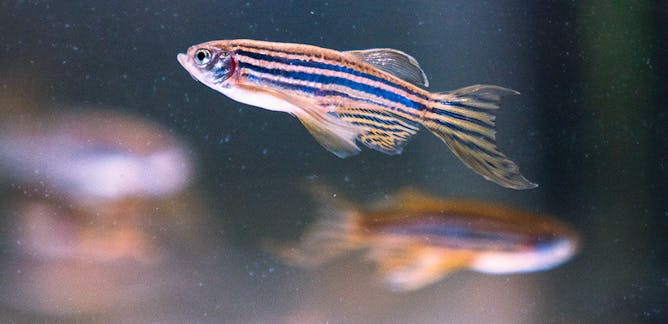|
|
|
|
Shabir Madhi, professor of vaccinology at the University of Witwatersrand, is a vaccine expert who has worked on COVID-19 vaccine trials in South Africa. He recalls that when he first saw the sequencing data on omicron, he was fairly optimistic that the immunity built up by vaccines and past waves of infections would protect more people against severe disease. And he was right. “We’ve seen a dramatic decoupling of infections, hospitalisations and death,” says Madhi, in the latest episode of The Conversation Weekly podcast.
Madhi and his colleague Jinal Bhiman, Principal Medical Scientist at National Institute for Communicable Diseases (NICD) in South Africa spoke to us about their discovery of omicron. But Madhi is also critical of initial scepticism in many parts of the world about the early data coming out of South Africa, which he describes as a “manifestation of cultural imperialism”.
Joining our regular podcast presenters Gemma Ware and Daniel Merino for this episode is Ozayr Patel, digital editor for The Conversation based in Johannesburg. Also coming out of South Africa we have a report on a study showing that the herbal tea rooibos may help stave off anxiety – a cup or two of that could be just the job if you’ve had a big weekend, as another report we carry (from the UK) into “hangxiety” indicates that significant numbers feel extremely anxious when they have a hangover.
Elsewhere our colleagues in Canada have been providing rolling coverage of the “freedom convoy” that has brought roads and city centres to a standstill over the past couple of weeks. All their articles on the movement can be found here.
|

|
Stephen Khan
Executive Editor, The Conversation International
|
|

After South African scientists sounded the alarm about the new omicron variant, countries around the world closed their borders.
Kim Ludbrook/EPA
Gemma Ware, The Conversation; Daniel Merino, The Conversation
Plus, is the human emotional response to music innate or is it shaped by a person’s culture? Listen to The Conversation Weekly podcast.
|

A person holds a sign for the “freedom convoy” a cross-country convoy protesting a federal vaccine mandate for truckers, as people rally against COVID-19 restrictions on Parliament Hill.
THE CANADIAN PRESS/Justin Tang
Gerald Walton, Lakehead University
Truckers and their supporters have asserted their right to assemble and oppose COVID-19 protocols imposed by the federal, provincial and territorial governments.
|
|
|

Carine Smith, Stellenbosch University
Zebrafish are ideal for drug discovery especially in the context of neurological and inflammatory conditions.
| |

Craig Gunn, University of Bristol
Some estimates suggest around 12% of people experience ‘hangxiety’.
|
|
|
|
|
-
Hassan Vally, Deakin University
We can’t say whether longer Omicron survivability on surfaces relates to a greater risk of infection.
-
Kojo Kakra Twum, Presbyterian University College; Antoinette Yaa Benewaa Gabrah, University of Professional Studies Accra; Ebenezer Nyarko Assabil, Presbyterian University College; John Paul Basewe Kosiba, University of Professional Studies Accra; Robert E. Hinson, University of Ghana
Mobile money service providers are on the path to find new ways of growing their customer base and keeping them.
-
Philippa Burne, The University of Melbourne
After 37 years and nearly 9,000 episodes, Neighbours could be coming to an end.
-
Holly Thorpe, University of Waikato; Belinda Wheaton, University of Waikato
The mainstream embrace of snowboarding for its youthful audience and sponsorship riches also dented its once-alternative image – but a new generation of stars could change all that.
|
|
The Conversation in Spanish and French
|

Paloma Rodera Martínez, Universidad Nebrija
La androginia de Man Ray sigue presente en el mundo de la moda un siglo después.
|

Anne Renault, Ifremer
À l’occasion du One Ocean Summit, qui se tient cette semaine à Brest du 9 au 11 février 2022, tour d’horizon des pistes de recherche prometteuses pour protéger le plus grand écosystème de notre planète.
|
| |
| |
| |
| |
|
|
|
|
|
|
|